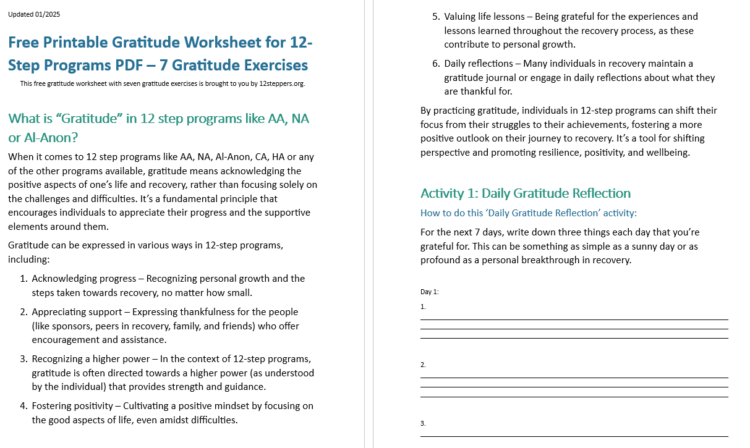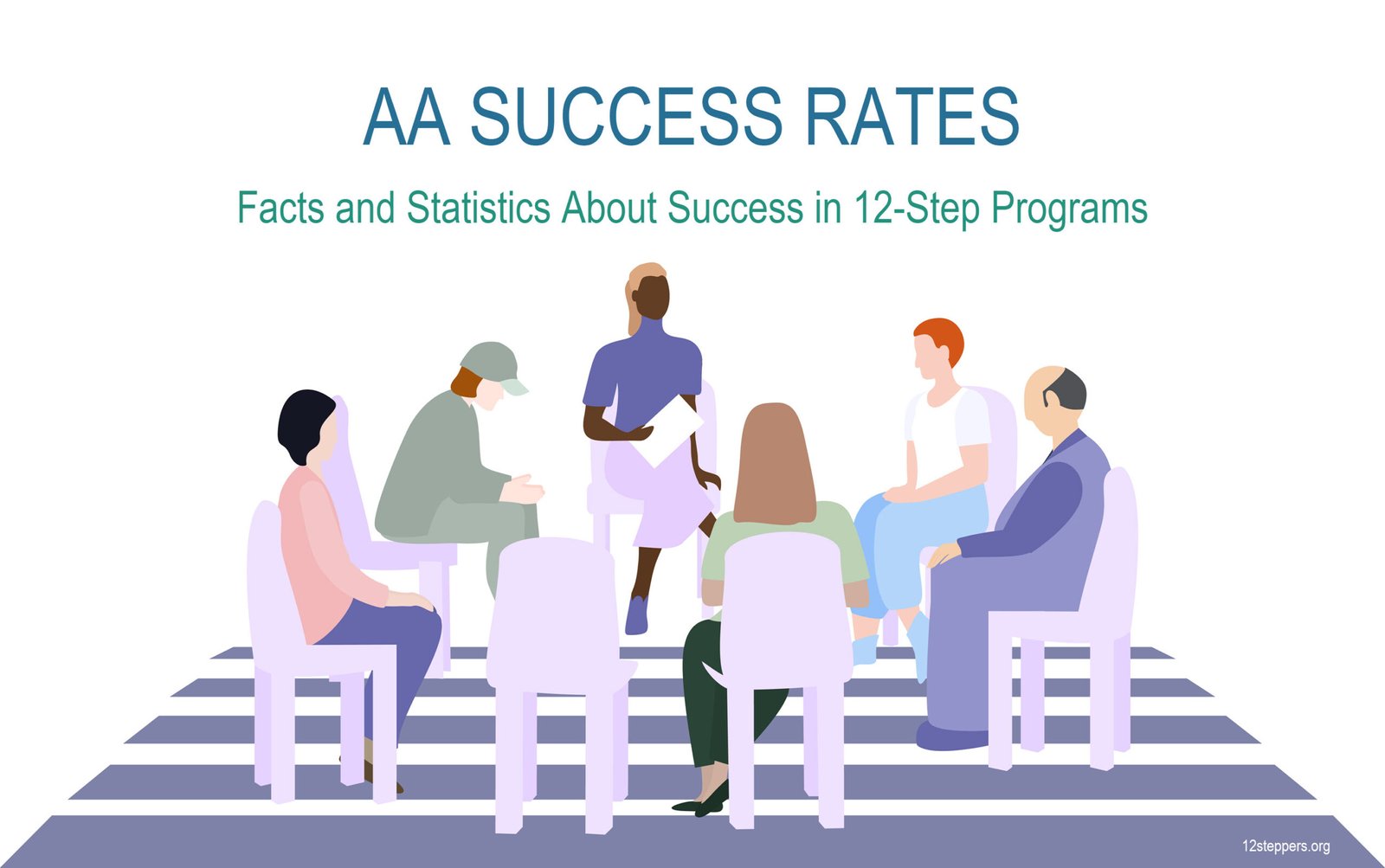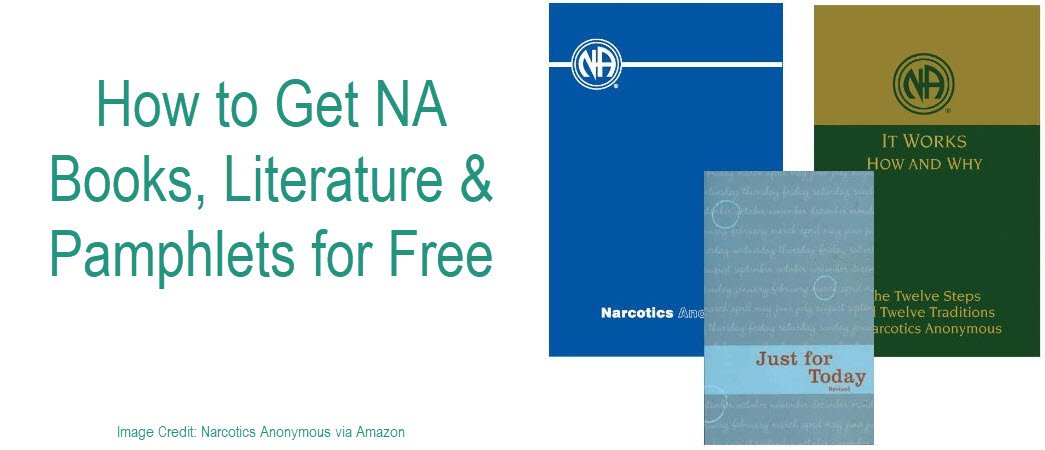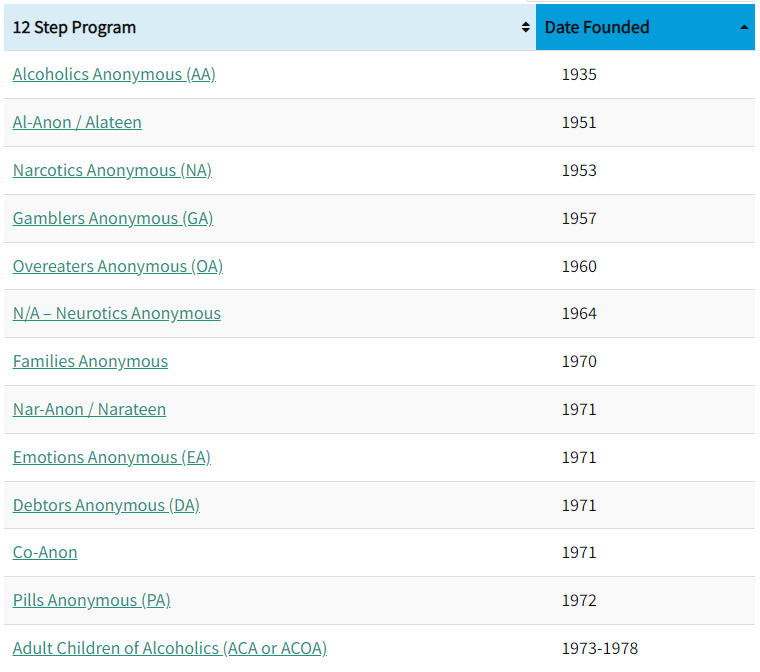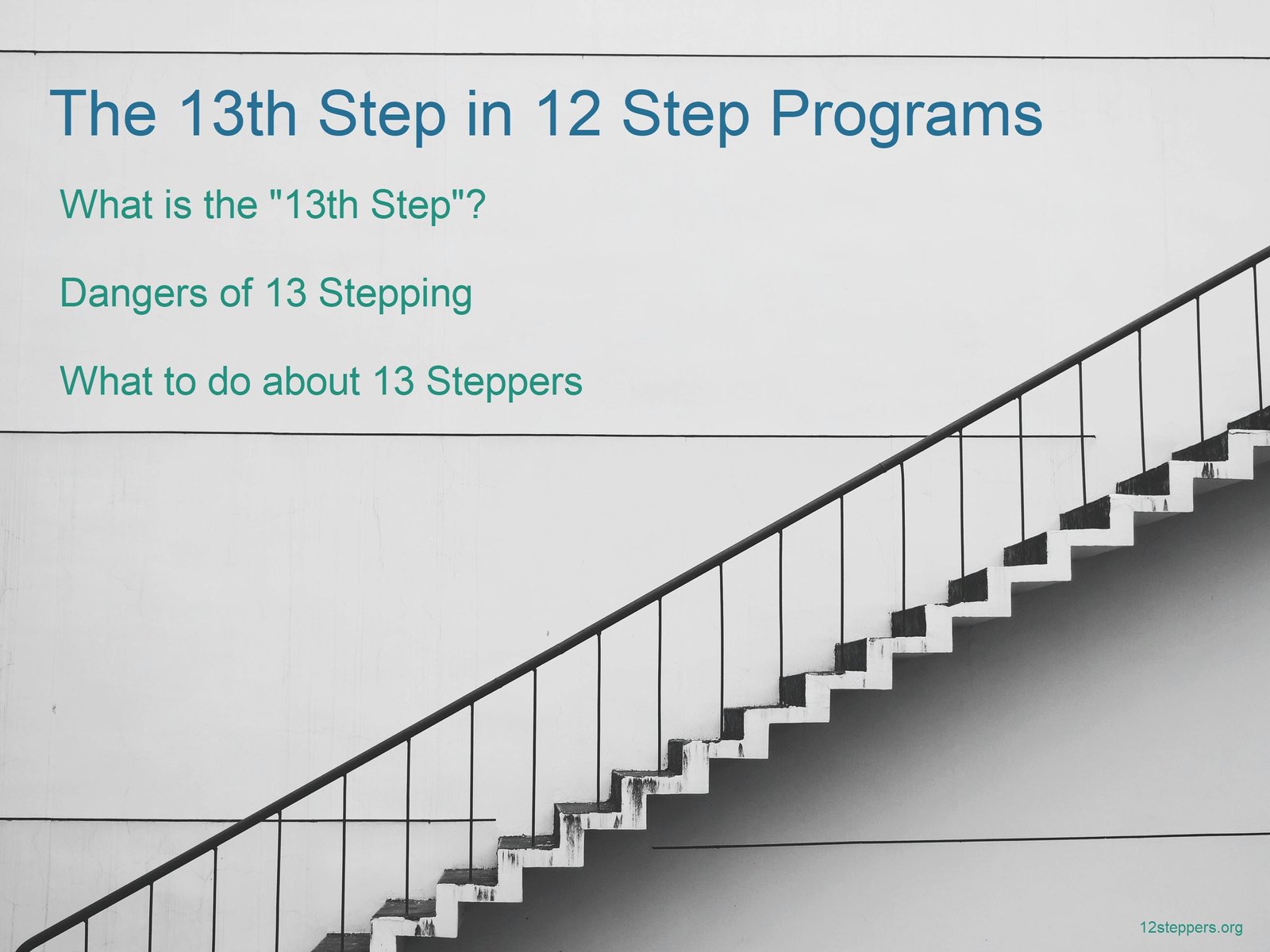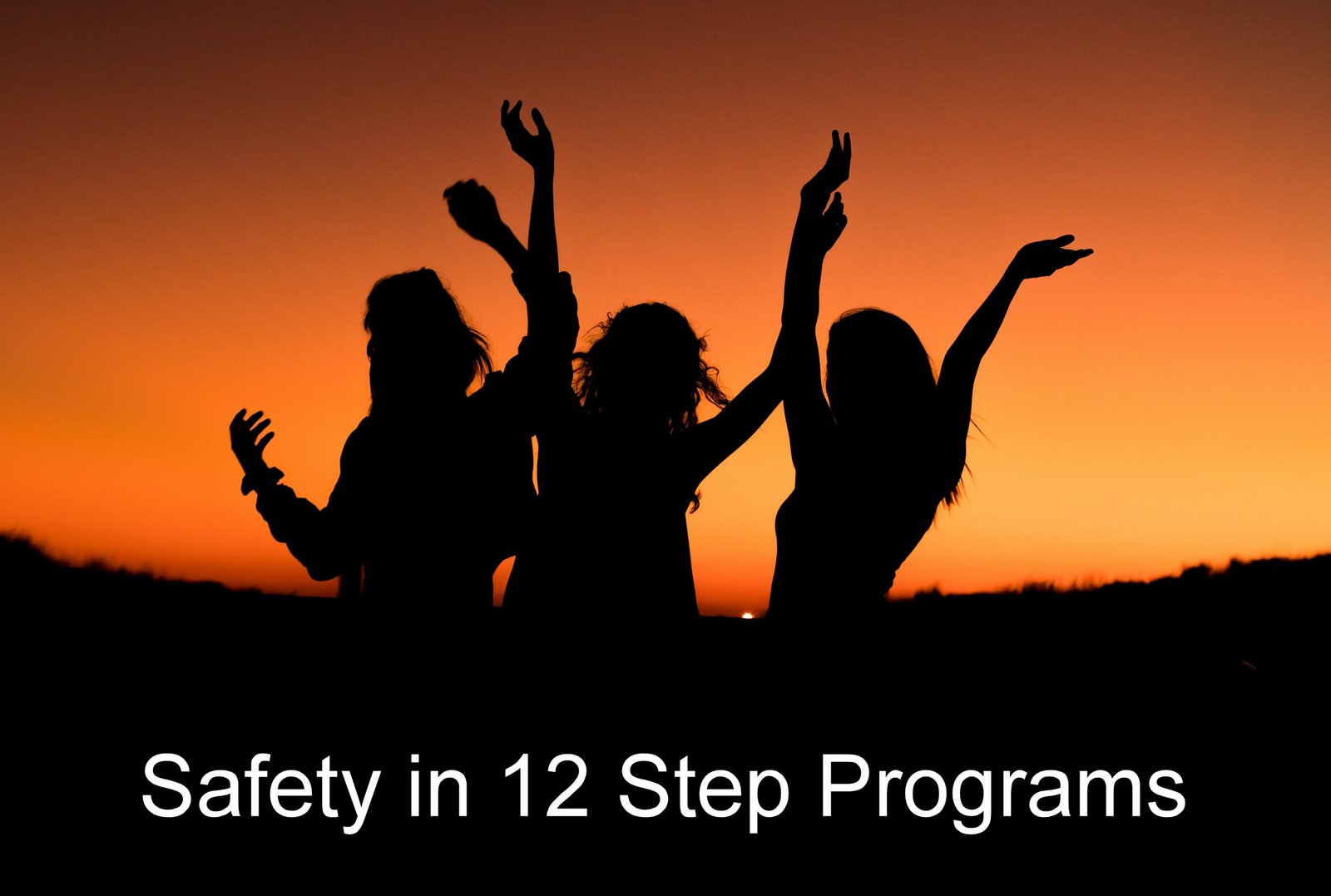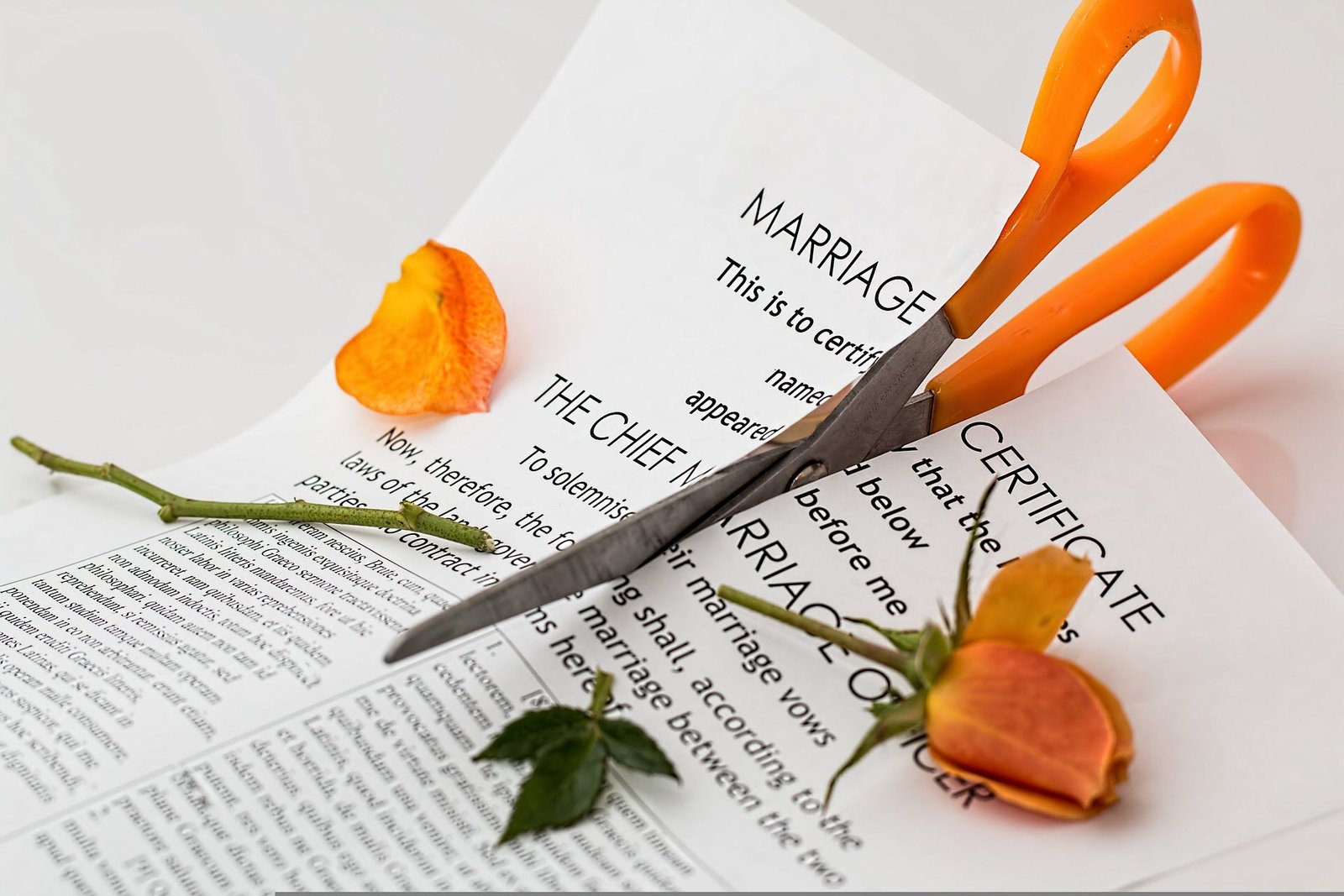Home » 12 Step Programs » 12-Step Worksheet with Questions – A Guide to Working the 12 Steps » Free Printable Gratitude Worksheet for 12-Step Programs PDF – 7 Gratitude Exercises
Free Printable Gratitude Worksheet for 12-Step Programs PDF – 7 Gratitude Exercises & Activities
Also see: 12 step worksheet
View, Download or Print this Free Gratitude Worksheet
Click the button below to view, print or download the gratitude worksheet. It offer 7 different gratitude exercises and activities. Scroll down on this page for a preview of what is included in this worksheet.
Additional Formats
Preview Each Gratitude Activity Before Downloading
What is “Gratitude” in 12 step programs like AA, NA or Al-Anon?
When it comes to 12 step programs like AA, NA, Al-Anon, CA, HA or any of the other programs available, gratitude means acknowledging the positive aspects of one’s life and recovery, rather than focusing solely on the challenges and difficulties. It’s a fundamental principle that encourages individuals to appreciate their progress and the supportive elements around them.
Gratitude can be expressed in various ways in 12-step programs, including:
- Acknowledging progress – Recognizing personal growth and the steps taken towards recovery, no matter how small.
- Appreciating support – Expressing thankfulness for the people (like sponsors, peers in recovery, family, and friends) who offer encouragement and assistance.
- Recognizing a higher power – In the context of 12-step programs, gratitude is often directed towards a higher power (as understood by the individual) that provides strength and guidance.
- Fostering positivity – Cultivating a positive mindset by focusing on the good aspects of life, even amidst difficulties.
- Valuing life lessons – Being grateful for the experiences and lessons learned throughout the recovery process, as these contribute to personal growth.
- Daily reflections – Many individuals in recovery maintain a gratitude journal or engage in daily reflections about what they are thankful for.
By practicing gratitude, individuals in 12-step programs can shift their focus from their struggles to their achievements, fostering a more positive outlook on their journey to recovery. It’s a tool for shifting perspective and promoting resilience, positivity, and wellbeing.
Activity 1: Daily Gratitude Reflection
How to do this ‘Daily Gratitude Reflection’ activity: For the next 7 days, write down three things each day that you’re grateful for. This can be something as simple as a sunny day or as profound as a personal breakthrough in recovery.
Day 1:
1. __________________________________________________________________________________________________________________________________________________________________________________
2. __________________________________________________________________________________________________________________________________________________________________________________
3. __________________________________________________________________________________________________________________________________________________________________________________
Day 2:
1. __________________________________________________________________________________________________________________________________________________________________________________
2. __________________________________________________________________________________________________________________________________________________________________________________
3. __________________________________________________________________________________________________________________________________________________________________________________
Day 3:
1. __________________________________________________________________________________________________________________________________________________________________________________
2. __________________________________________________________________________________________________________________________________________________________________________________
3. __________________________________________________________________________________________________________________________________________________________________________________
Day 4:
1. __________________________________________________________________________________________________________________________________________________________________________________
2. __________________________________________________________________________________________________________________________________________________________________________________
3. __________________________________________________________________________________________________________________________________________________________________________________
Day 5:
1. __________________________________________________________________________________________________________________________________________________________________________________
2. __________________________________________________________________________________________________________________________________________________________________________________
3. __________________________________________________________________________________________________________________________________________________________________________________
Day 6:
1. __________________________________________________________________________________________________________________________________________________________________________________
2. __________________________________________________________________________________________________________________________________________________________________________________
3. __________________________________________________________________________________________________________________________________________________________________________________
Day 7:
1. __________________________________________________________________________________________________________________________________________________________________________________
2. __________________________________________________________________________________________________________________________________________________________________________________
3. __________________________________________________________________________________________________________________________________________________________________________________
Activity 2: Gratitude for Support
How to work the ‘Gratitude for Support’ activity: Think of the people who have been supportive throughout your recovery process. Write a thank you note or letter expressing your appreciation. You can actually send or choose to only write it and not send it.
Dear ___________________,
____________________________________________________________________________________________________________________________________________________________________________________________________________________________________________________________________________________________________________________________________________________________________________________________________________________________________________________________________________________________________________________________________________________________________________________________________________________________________________________________________________________________________________________________________________________________________________________________________________________________________________________________________________________________________________________________________________________________________________________________________________________________________________________________________________________________________________________________________________________________________________________________________________________________________________________________________________________________________________________________________________________________________________________________________________________________________________________________________________________________________
With Gratitude,
___________________
Activity 3: Recognizing Progress in Recovery
How to work the ‘Recognizing Progress in Recovery’ activity: Reflect on the progress you’ve made in your recovery. Write down three aspects of your recovery for which you feel grateful, even if they seem small. Every step forward counts.
1. __________________________________________________________________________________________________________________________________________________________________________________
2. __________________________________________________________________________________________________________________________________________________________________________________
3. __________________________________________________________________________________________________________________________________________________________________________________
Activity 4: Visualizing a Grateful Future
How to work the ‘Visualizing a Grateful Future’ activity: Imagine your life in the future where you’re maintaining a successful recovery. What would you be grateful for? Write about this future scenario in detail.
____________________________________________________________________________________________________________________________________________________________________________________________________________________________________________________________________________________________________________________________________________________________________________________________________________________________________________________________________________________________________________________________________________________________________________________________________________________________________________________________________________________________________________________________________________________________________________________________________________________________________________________________________________________________________________________________________________________________________________________________________________________________________________________________________________________________________________
Activity 5: Gratitude Walk
How to do the ‘Gratitude Walk’ activity: Go for a walk around your neighborhood or in a park. Try to notice and appreciate the simple things and beauty around you. List down five things that you appreciated during this walk.
1.
____________________________________________________________________________________________________________________________________________________________________________________________________________________________________________________________________________________________________________________________________________________________________
2.
____________________________________________________________________________________________________________________________________________________________________________________________________________________________________________________________________________________________________________________________________________________________________
3.
____________________________________________________________________________________________________________________________________________________________________________________________________________________________________________________________________________________________________________________________________________________________________
4.
____________________________________________________________________________________________________________________________________________________________________________________________________________________________________________________________________________________________________________________________________________________________________
5.
____________________________________________________________________________________________________________________________________________________________________________________________________________________________________________________________________________________________________________________________________________________________________
Activity 6: Gratitude Towards Higher Power
How to do the ‘Gratitude Towards Higher Power’ activity: In your own understanding of a Higher Power, write down three things for which you are grateful to this Higher Power (as understood in Step 3 of the 12 Steps). Think about the strength and guidance you’ve received from your Higher Power, how it’s helped you & why you’re appreciative of it.
1.
____________________________________________________________________________________________________________________________________________________________________________________________________________________________________________________________________________________________________________________________________________________________________
2.
____________________________________________________________________________________________________________________________________________________________________________________________________________________________________________________________________________________________________________________________________________________________________
3.
____________________________________________________________________________________________________________________________________________________________________________________________________________________________________________________________________________________________________________________________________________________________________
Activity 7: Self-Gratitude (for Self-Esteem & Self-Worth)
How to do the ‘Self-Gratitude’ activity: List five qualities or actions you appreciate about yourself. These can be related to your strength in recovery, personal achievements or growth, or any positive qualities you recognize in yourself.
1.
____________________________________________________________________________________________________________________________________________________________________________________________________________________________________________________________________________________________________________________________________________________________________
2.
____________________________________________________________________________________________________________________________________________________________________________________________________________________________________________________________________________________________________________________________________________________________________
3.
____________________________________________________________________________________________________________________________________________________________________________________________________________________________________________________________________________________________________________________________________________________________________
4.
____________________________________________________________________________________________________________________________________________________________________________________________________________________________________________________________________________________________________________________________________________________________________
5.
____________________________________________________________________________________________________________________________________________________________________________________________________________________________________________________________________________________________________________________________________________________________________
Practicing gratitude through these exercises can help in your recovery journey, as it assists in redirecting your attention away from the hardships and obstacles towards the accomplishments, development, and uplifting facets of your journey. Bear in mind, recovery is more about the journey than the endpoint. Revel in the steps you’ve made forward and always treat yourself with compassion throughout the process.
Why is gratitude important in recovery?
Gratitude is a powerful tool in recovery from addiction for several reasons:
- Shifts Focus – Gratitude can shift focus from what is lacking or difficult in life to what is positive and fulfilling. This change in perspective can help to reduce feelings of frustration, sadness, or discontentment which can often lead to relapse.
- Promotes Positivity – Regularly practicing gratitude can foster a more positive outlook on life, which can be particularly beneficial during the challenging process of recovery. It can help to boost mood, reduce stress, and increase overall happiness, making the recovery journey a more positive experience.
- Enhances Resilience – Being grateful even in the face of difficulties can enhance resilience. By recognizing the positive aspects, you can improve your resilience to stress and bounce back from difficult situations. This acknowledges the reality that, even though like presents challenging circumstances, it still holds good and valuable elements.
- Improves Self-Esteem – Gratitude can help to boost self-esteem, as it allows individuals to appreciate their own achievements and progress. This is particularly relevant in a recovery context, where recognizing and valuing personal growth is crucial.
- Strengthens Relationships – Expressing gratitude can improve relationships, which are often strained in times of addiction. This can help to rebuild damaged relationships or foster new, healthy ones – a key aspect of the social support needed for recovery.
- Facilitates Spiritual Growth – In 12-step programs and similar recovery models, spirituality is a major component of healing. Gratitude is a practice that is inherently spiritual and can help individuals feel more connected to their higher power or the world around them.
Tips to Successfully Working This Gratitude Worksheet
Working on a gratitude worksheet requires a consistent commitment and an open mind. Here’s how you can approach it:
- Set aside time – Make a commitment to spend some time on this worksheet each day, even if it’s only for a few minutes. Consistency is key.
- Quiet space – Find a quiet, comfortable space where you won’t be disturbed. This will help you to concentrate and make the most out of the process.
- Be honest with yourself – Honesty is crucial. Write down what genuinely makes you feel grateful, not what you think you should be grateful for.
- Detail is key – Try to be specific with your entries. Rather than writing general statements like “I’m grateful for my family,” delve into specifics like, “I’m grateful for my sister’s constant support and help in dealing with this specific problem.”
- Keep an open mind – It might be challenging some days but try to find something to be grateful for even on difficult days. It’s okay if these are small things.

